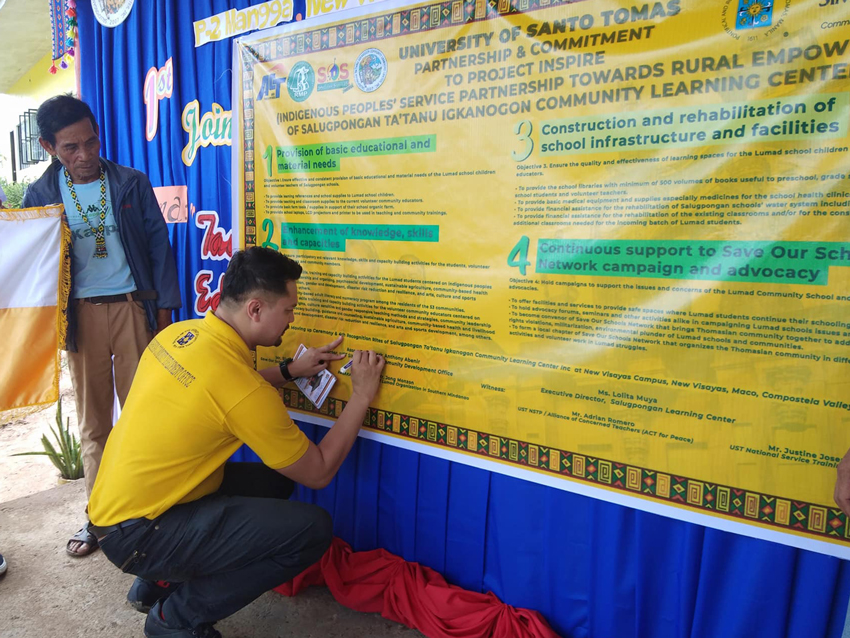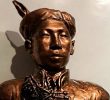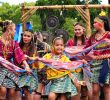
Mark Anthony Abenir, director of Simbahayan Community Development office of UST signs the Memorandum of Agreement with Salugpongan Ta’ Tanu Igkanugon Community Learning Center (STTICLC) to mark the university’s thrust to support accessible education for indigenous people of Mindanao. (Photo courtesy of Save Our Schools Network)
DAVAO CITY, Philippines – The University of Santo Tomas (UST) community outreach department partnered with a Lumad school here to mark the university’s thrust to support accessible education for indigenous people of Mindanao.
Mark Anthony Abenir, director of Simbahayan Community Development office of UST along with two faculty members represented the university during the Joint Recognition Rites of Salugpongan Ta’ Tanu Igkanugon Community Learning Center (STTICLC) on Friday, April 20 at the Lumad school’s campus in New Visayas, Maco town, Compostela Valley.
Abenir, in a Facebook post on Saturday, assured the Lumad students and educators of STTICLC that UST “will follow up and make true (the) commitments” they made such as to 1) Help in the provision of basic educational and material needs; 2) Enhancement of knowledge, skills, and capacities of volunteer Lumad School teachers; 3) Help in finding resources for the construction and rehabilitation of Lumad schools; and 4) Continuous support to Save Our Schools Network and Advocacy.
Abenir said his visit to the Lumad school was a humbling experience, “they [Lumad students] have shown to me that they truly value education.”
“But this is not just any education we see in the mainstream system,” Abenir added, “They value an education that is tailored for the Lumads, with the Lumads, and by the Lumads.”
He also said that his visit to the Lumad school showed him the impact of the implementation of Martial Law in Mindanao.
“Aside from being present in the said ceremony, I was also there to see, first hand, the impact of militarization and martial law in the lives of our Lumad brothers and sisters. The impact of the threat of the Philippine President in ordering the bombing of Lumad Schools,” said Abenir.
STTICLC has 52 campuses that provide basic education in far flung Lumad and peasant communities across the Davao region.
According to Lolit Muya, executive director of STTICLC, the partnership forged with UST is a big help for Lumad children who are deprived of complete basic education.
“I saw hope in their [Lumad] faces during the ceremony. They were optimistic that with the help of UST, they can continue their studies and achieve their dream to be educated despite the difficulties posed by military operations in their communities,” said Muya.
Muya added the assistance they received from UST is an “additional moral support” amidst the red-tagging and harrassments they experience allegedly by the military.
Aside from educational materials, UST also inked a Memorandum of Agreement with STTICLC to provide basic farm tools and supplies needed for the school’s organic farm and agriculture programs.
In addition to the skills training and capacity buildings among Lumad students and volunteer teachers, UST committed to conduct literacy and numeracy program for adults in communities served by STTICLC.
The university vowed to provide a minimum of 500 volumes of books for elementary and high school learners to all Lumad school’s libraries.
UST will provide financial assistance in the rehabilitation of existing classrooms, water system and sanitary facilities of STTICLC.
They will help in the construction of additional two classrooms for the upcoming batch of students.
As part of the university’s advocacy for the Lumad, it committed to offer “safe spaces” for Lumad students to continue their education during Lakbayan (protest caravan) in Manila and conduct activities to propagate the issues and concerns affecting Lumad schools in Mindanao.
READ: INFOGRAPHIC: Why are Lumad students protesting against DepEd?
In September last year, University of the Philippines Diliman and UST offered a space in their campus for Lumad students to conduct classes dubbed as “Bakwit Schools.” Hundreds of indigenous people trooped to Manila to protest the militarization in their ancestral lands. (davaotoday.com)










